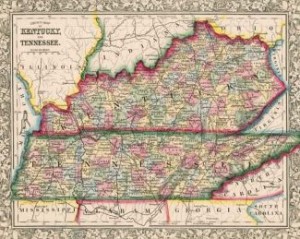 Well into the second year of war, many Baptist churches of the Confederacy have fallen upon dire times. Today, the second oldest Baptist church in the state of Tennessee faces the realities of a war-time economy.
Well into the second year of war, many Baptist churches of the Confederacy have fallen upon dire times. Today, the second oldest Baptist church in the state of Tennessee faces the realities of a war-time economy.
On April 20, 1794–two years before Tennessee became the sixteenth state of the United States–Baptists from the Three Forks Baptist Church of Watauga County, North Carolina, traveled to present-day Johnson County, Tennessee and helped birth the second Baptist church in Tennessee, the Roan Creek (Baptist) Church of Christ. Originally housed in a log building in the shadow of Rainbow Mountain, the church preceded the development of the surrounding area. These early Baptists in Tennessee’s mountains were pioneers in every respect, living off the land and enduring the elements of nature without the comforts of city life.
In 1836, Johnson County was established and the county seat of Taylorsville created (the name of the town was changed to Mountain City in 1885). Seven years later, in 1843, the members of the Roan Creek congregation moved from the countryside into Taylorsville, building a brick house of worship and becoming known as Mountain City Baptist Church (later, First Baptist Church Mountain City). Along with the town, the church grew and prospered. In 1858, an addition to the facilities was begun. Construction proceeded slowly, and then was interrupted by the Civil War.
Unable to pay construction loans, church members on October 1, 1861 “gave the deed of trust to Bartlett Wood and Isaac McQueen to secure the balance due them for labor and material used” in the building project.
An old deed shows that payments were made to McQueen as follows: A horse valued $125 and another valued at $115, paid by Mathias M.Wagner; $15 paid by David Kitzmiller and $10 paid by Abraham Johnson. The deed also showed that McQueen himself donated $10 to the debt.
However, church members prove unable to pay their obligations due to the hardships caused by the war, and today the church is placed on the auction block, selling for $550 to Mathias M. Wagner.
Wagner allows the church to continue using the building, and in either 1874 or 1885 (accounts differ), Wagner deeds the building back to the church on the condition that should it cease to be used as a place of worship, ownership would pass to the Wagner heirs.
Despite difficult times during the war and Reconstruction, the church survives and grows, remaining to the present.
Sources: Nancy Jenkins, “Mountain City Church, Dating To 1794, To Be Razed, Replaced With New One,” Johnson City Press Chronicle, January 1948? (link); First Baptist Church Mountain City History (link); Mountain City, Tennessee (link)


